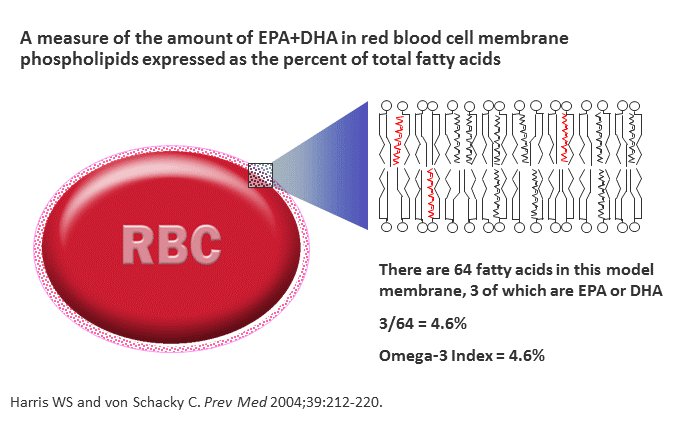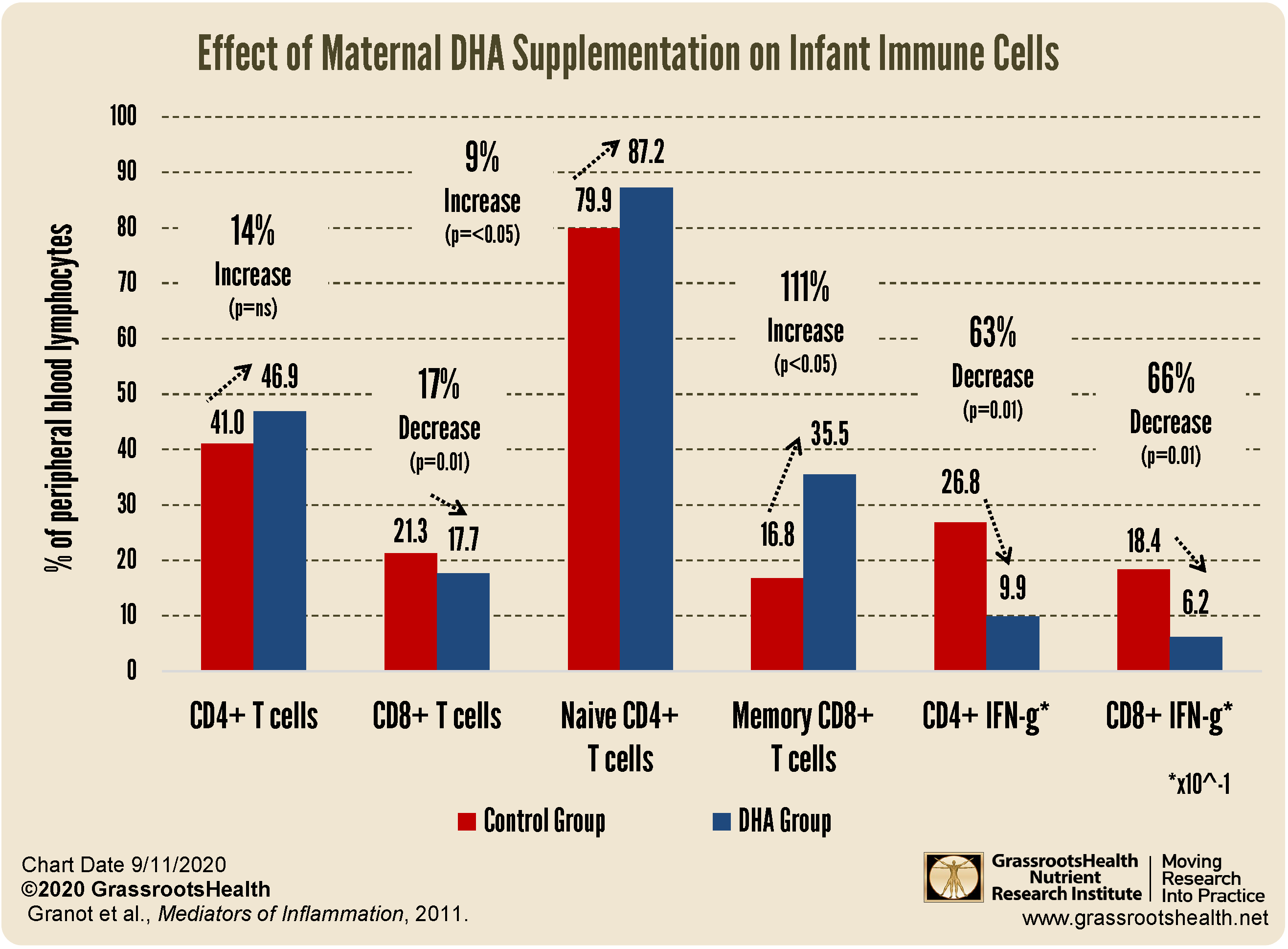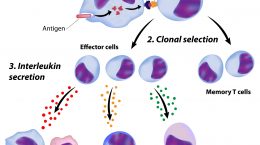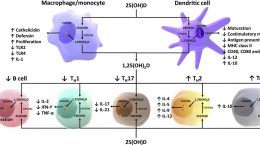Published on September 14, 2020
 Omega-3 fatty acids play a role in immune system function. They are incorporated into the cell membrane of immune cells, as well as many other cells, and are metabolized to eicosanoids, a group of signalling molecules important for controlling levels of inflammation. Increased intake also increases the EPA and DHA content of immune cell membranes, mainly by displacing arachidonic acid (AA, an omega-6 fatty acid), and become the substrate for the enzymes that make eicosanoids. EPA- and DHA-derived eicosanoids are less potent inducers of inflammation (compared to those derived from AA ) and produce anti-inflammatory compounds that “turn off” the inflammatory response. EPA and DHA carried to areas of inflammation are metabolized to produce several types of mediators that result in the resolution of inflammation (resolvins, protectins, and maresins). EPA and DHA have an overall anti-inflammatory effect, as shown in a recently reviewed paper on DHA and inflammatory markers.
Omega-3 fatty acids play a role in immune system function. They are incorporated into the cell membrane of immune cells, as well as many other cells, and are metabolized to eicosanoids, a group of signalling molecules important for controlling levels of inflammation. Increased intake also increases the EPA and DHA content of immune cell membranes, mainly by displacing arachidonic acid (AA, an omega-6 fatty acid), and become the substrate for the enzymes that make eicosanoids. EPA- and DHA-derived eicosanoids are less potent inducers of inflammation (compared to those derived from AA ) and produce anti-inflammatory compounds that “turn off” the inflammatory response. EPA and DHA carried to areas of inflammation are metabolized to produce several types of mediators that result in the resolution of inflammation (resolvins, protectins, and maresins). EPA and DHA have an overall anti-inflammatory effect, as shown in a recently reviewed paper on DHA and inflammatory markers.
The Omega-3 Index measures the amount of EPA and DHA in the membranes of red blood cells as a percentage of total fatty acids, with a target of 8% or higher.

Breast Milk Contains Omega-3 Fatty Acids Important For Protecting Babies
Breast feeding is believed to be the best source of nutrition for newborns and it also contains immune cells, antibodies, and other factors that provide protection during infancy. Breastmilk also contains omega-3 fatty acids, including docosahexanoic acid (DHA), important for the infant’s developing immune system. The content of DHA in breastmilk is dependent on the mother’s diet. The Western diet is high in omega-6 fatty acids and relatively low in omega-3’s. In fact, it has been recommended that intake of DHA should be 200-300 mg per day during pregnancy and lactation to provide adequate DHA for the growing baby.
The current paper by Granot et al. investigated whether DHA supplementation during pregnancy and lactation affected immune cell numbers and function in babies breastfed up to 4 months of age.
The Study Design:
- 60 pregnant women 20-35 years old in at least their 3rd pregnancy were randomized to either the treatment or control group
- Treatment group received 400 mg of DHA each day in softgel capsules
- DHA supplements were taken daily from the first trimester through pregnancy and lactation up to 4 months after the baby was born
- Diet of all the mothers included at least 2 servings of fish per week
What Did They Find?
Although total lymphocyte numbers (T cells and B cells) did not change, the number of T cell subsets (discussed in a previous post) were affected by DHA supplements.
In the DHA-supplemented group:
- Numbers of CD8+ cytotoxic T cells were lower with a higher proportion of memory CD8+ (CD45RO+) T cells
- There was a higher ratio of CD4+/CD8+ T cells
- The number of naïve T cells (CD45RA+) was significantly higher
- IFN-gamma, an inflammatory cytokine, produced by CD4+ and CD8+ T cells was markedly lower
What Does This Mean?
A higher percentage of CD4+ naïve T cells with lower IFN-gamma production in both CD4+ and CD8+ T cells indicates lower levels of inflammation which limits tissue damage during infections. Memory CD8+ T cells play a role in fighting off viral infections and higher levels may improve that response.
This research suggests that DHA supplementation during pregnancy and breast feeding may result in an improved immune response of the infant.
Nutrients Work Together for Immune and Overall Health!
Could getting more of certain immune boosting nutrients help to decrease your levels of inflammation, and improve your immune response? Find out by testing your vitamin D, omega-3s, magnesium and other essential elements (including copper and zinc), as well as your inflammation levels, with the Immune Boost home test kit offered by GrassrootsHealth. Measuring levels is the only way to know if you are supporting your immune system and whether additional changes should be made, with supplementation, dietary changes, or both.
How can I track my nutrient intake and levels over time?
To help you track your supplement use and nutrient levels, GrassrootsHealth has created the Personal Health Nutrient Decision System called
For each specific supplement, you can track what days you take it, how much, and many other details. This will help you know your true supplemental intake and what patterns of use work for you to reach and maintain optimum nutrient levels. Check it out today!








